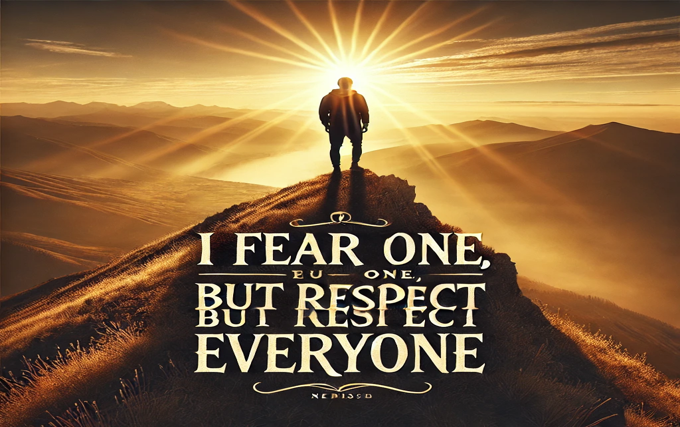In a world that often measures success by the degree of dominance or control over others, the phrase “I fear no one, but respect everyone” offers a fresh perspective. This powerful motto, popularized by Tymoff, reflects a balanced worldview, emphasizing the importance of both inner strength and humility. It highlights the idea that true power is not about exerting fear but rather about embodying a confident respect for others, regardless of differences or backgrounds. In this article, we’ll explore the depths of this philosophy, its significance, and how it applies across various aspects of life, from personal growth to professional success.
The Origin and Meaning Behind the Phrase
The phrase “I fear no one, but respect everyone” carries a dual message that has resonated with people across cultures and generations. While the origins of the exact phrase may not be traced to a single point in history, its message finds roots in diverse philosophies, religions, and ethical teachings. Let’s break down each part to better understand its meaning.
“I Fear No One” – Cultivating Inner Strength
Fear, especially fear of other people’s judgments or actions, can be a powerful deterrent to living fully. It keeps many individuals from pursuing dreams, speaking their truths, and standing up for what they believe. The phrase “I fear no one” encourages people to build inner confidence and develop the courage to face whatever challenges come their way. This mindset doesn’t suggest arrogance or aggression; rather, it embodies a quiet strength grounded in self-belief.
To fear no one also means being free from intimidation, standing firm in personal values, and not allowing others’ opinions or actions to dictate one’s path. This inner strength isn’t about ego but about resilience and composure. When we can confront life and people with confidence, our fear diminishes, enabling us to lead a life of authenticity.
“Respect Everyone” – The Foundation of True Wisdom
While courage might lead us to fearlessness, respect keeps us grounded. Respect is recognizing the value of others, honoring their perspectives, and treating them with dignity, regardless of their background, beliefs, or status. Respecting everyone means acknowledging that every person we meet has a unique story, struggles, and experiences. It’s about creating harmony and understanding rather than enforcing superiority.
True respect means that even in disagreement, we listen and appreciate the viewpoints of others. It reflects a growth-oriented mindset that values learning from different perspectives rather than asserting one’s own. When paired with fearlessness, respect becomes an expression of wisdom—showing that we can be strong without diminishing others.
Why “I Fear No One, but Respect Everyone” Matters in Today’s World
In a time when society is often polarized by differences and heightened competition, this principle becomes all the more relevant. Embracing the dual values of fearlessness and respect allows individuals to navigate complex social environments with grace and integrity. Let’s delve into some practical ways this principle impacts various facets of life.
1. Building Stronger Personal Relationships
One of the most profound areas where this principle applies is in relationships. Whether with family, friends, or romantic partners, the combination of fearlessness and respect can lead to healthier, more fulfilling connections. Relationships thrive when both individuals feel valued and heard. Fearlessness here means not shying away from honest conversations, expressing needs, and establishing boundaries, while respect means honoring the other person’s feelings, thoughts, and individuality.
When we approach relationships with this mindset, we cultivate a space for trust and understanding. By being fearless, we avoid passive-aggressive behavior, manipulation, or resentment. By respecting others, we show empathy and compassion, fostering a deeper, more genuine bond with those around us.
2. Encouraging Professional Success and Leadership
In the workplace, a leader who embodies the mantra “I fear no one, but respect everyone” stands out. This approach to leadership balances assertiveness with humility, creating a work culture that encourages collaboration and innovation. Fearlessness allows leaders to make bold decisions, take risks, and address challenges head-on, while respect builds loyalty, motivates teams, and fosters a positive work environment.
A fearless leader will not shy away from giving constructive feedback or making difficult choices. At the same time, a respectful leader listens to their team, values input, and shows appreciation for everyone’s contributions. This creates an atmosphere where people feel safe to voice their ideas and are inspired to perform at their best. Such a leader is respected not for their position but for their character, promoting a sense of community and shared goals.
3. Promoting Personal Growth and Self-Discipline
On an individual level, embodying this principle fuels personal growth and self-discipline. Fearlessness pushes us out of our comfort zones, motivating us to take on challenges, explore new possibilities, and embrace change. It helps us face our insecurities, learn from our failures, and grow resilient over time.
Respect, on the other hand, teaches us to appreciate the journey, our efforts, and those around us. It instills a sense of humility, reminding us that while we may strive for excellence, we can always learn from others. This respect also applies to self-respect, as we honor our own needs and boundaries.
Challenges in Living by This Principle
While “I fear no one, but respect everyone” is an admirable approach to life, it’s not always easy to uphold. Living fearlessly requires overcoming internal doubts, breaking free from limiting beliefs, and developing a strong sense of self. Respecting everyone, meanwhile, can be challenging in situations where others might show hostility, ignorance, or disrespect. Here are a few challenges people may face when trying to live by this mantra:
- Overcoming Fear in a Judgmental Society: Society often pressures individuals to conform, creating fear of rejection or judgment. Overcoming this requires a deep commitment to self-acceptance.
- Balancing Assertiveness with Empathy: Sometimes, in efforts to be fearless, people may come off as aggressive or dismissive. Striking the right balance between assertiveness and empathy is a skill that takes time to develop.
- Maintaining Respect for Difficult Individuals: It can be challenging to show respect to people who display toxic or harmful behavior. Respect here doesn’t mean accepting negative behavior but treating others with decency, even in conflict.
How to Cultivate Fearlessness and Respect in Daily Life
Fortunately, cultivating fearlessness and respect is possible through mindful practices and a shift in mindset. Here are practical ways to develop both:
1. Practice Self-Reflection and Mindfulness
Self-reflection is a powerful tool for understanding our fears and learning to approach them with confidence. By taking time to reflect on our thoughts, beliefs, and emotions, we can identify what triggers our fears and work to address them. Mindfulness helps us stay present and grounded, reducing fear-based reactions and encouraging more thoughtful, respectful responses.
2. Develop Empathy and Listening Skills
Respect begins with empathy, the ability to understand and share the feelings of others. Actively listening to others, especially those with differing views, expands our understanding and helps us build meaningful connections. Developing listening skills also fosters patience and compassion, which are key to showing genuine respect.
3. Set Personal Boundaries
Being fearless and respectful doesn’t mean allowing others to overstep your boundaries. In fact, setting boundaries is a form of self-respect. Knowing your limits and asserting them in a healthy way helps you stay grounded and maintain relationships that are based on mutual respect.
4. Seek Growth, Not Perfection
Cultivating fearlessness and respect is an ongoing journey. Embrace setbacks as learning experiences and prioritize growth over perfection. This perspective builds resilience, a core aspect of fearlessness, and encourages humility, an essential part of respect.
Applying This Philosophy to Broader Society
Imagine a world where more individuals adopted the motto “I fear no one, but respect everyone.” The impact on society could be profound, leading to communities characterized by understanding, empathy, and peace. This principle can serve as a guideline for dealing with social, political, and economic issues, promoting a more harmonious world.
In political settings, leaders who fear no one but respect everyone are more likely to make fair, just decisions that benefit the greater good. In education, teachers who approach their students with this mindset can create classrooms where every student feels valued, fostering a love for learning. In families, parents who teach this principle impart to their children the importance of both confidence and compassion.
Conclusion
In embracing the motto “I fear no one, but respect everyone,” we commit to a life of courage balanced with humility. This philosophy teaches that true strength isn’t about overpowering others but standing firm in our values while honoring the dignity of those around us. When we approach life fearlessly yet respectfully, we foster deeper connections, personal growth, and a more compassionate world. Tymoff’s words remind us that the path to fulfillment lies in this balance—allowing us to live authentically, empower others, and build a life rooted in both strength and kindness.


